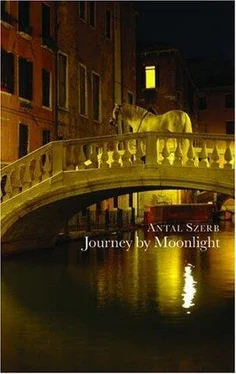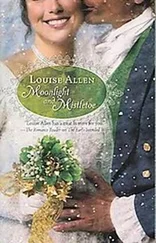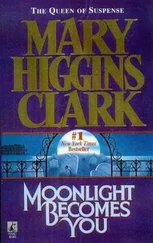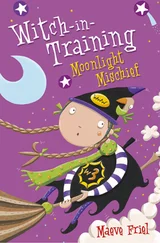“Have you so much to do?”
“Terrible. You lay people can’t imagine how much. I’ve still got a pile of prayers to get through.”
“But then, when will you have time? And where can we meet?”
“There’s only one way, Mishy, but I’m afraid it’ll be rather uncomfortable for you.”
“Ervin! Do you think comfort matters to me, if it’s a question of talking with you?”
“Because you’ll have to come up to the monastery. We are never allowed out, except on pastoral duty, like the funeral today, for example. And up in the monastery every hour of the day has its tasks. There’s only one way we could speak together without interruption. You know we go to church at midnight to say psalms. At nine we usually go to bed and sleep till midnight. But this sleep isn’t obligatory. The period isn’t governed by regulation, and silence is not prescribed. That’s when we could talk together. The wisest thing would be for you to come up to the monastery after dinner. Come as a pilgrim. We’re always receiving pilgrims. Bring a small gift for Sant’ Ubaldo, to please the brothers. A few candles perhaps, that’s the usual thing. And ask the brother at the gate to put you into the pilgrims’ room for the night. You realise it’ll be pretty uncomfortable compared with what you’re used to — but I won’t say anything more. Because, if you left at midnight to go back to the town, I’d be very worried. For that you would have to know your way about the hill. If you aren’t familiar with it, it can be a very unfriendly place. Hire a boy to bring you up. Will that be good?”
“It will be good, Ervin, very good.”
“So, until then, God be with you. I must hurry, I’m already late. See you tonight. God be with you.”
And he set off with rapid strides.
Mihály wandered back to the town. Beside the cathedral he found a shop and bought some rather fine candles for Sant’ Ubaldo. Then went back to his hotel, dined, and tried to think what sort of accessories to take with him in his guise of pilgrim. He eventually made a neat little package of the candles, his pyjamas and toothbrush, to all appearances the bundle of a genuine pilgrim. Then he commissioned the waiter to find him a guide. The waiter soon returned with a young lad, and they took to the road.
On the way he enquired after the local sights. He asked what had happened to the wolf Saint Francis had befriended, and the bargain it had made with the town.
“That must have been a long time ago,” the boy replied thoughtfully, “even before Mussolini. There certainly haven’t been any wolves since he became Duce .” But he did seem to recall, as something he had heard, that the wolf’s head was buried in some faraway church.
“Is it usual for pilgrims to go up to the monastery?”
“Of course, often. Sant’ Ubaldo is said to be very good for knee and back pains. Perhaps you have a bad back yourself, sir?”
“Not so much my back … ”
“But he’s very good for anaemia and bad nerves. The numbers are specially large on May 16th. That’s the Saint’s day. On that day they carry up the Ceri —figures made of wax — in a procession from the cathedral up to the monastery. But that’s not such a big procession as Corpus Christi or Resurrection Sunday. When they parade the Ceri they have to run.”
“What do the Ceri represent?”
“That nobody knows. They’re very old.”
The religious historian in Mihály was aroused. He would have to see these later. It was most interesting that they ran with them up to the monastery … like the Bacchantes running up the hill at the festival of Dionysos, in Thrace. This Gubbio was really remarkably old: the Umbrian tablets, the doors of the dead. Perhaps even the wolf tamed by St Francis was some old Italian deity, related to the she-wolf that mothered Romulus and Remus, living on in the legend. How very strange that Ervin should have come to just this place …
After an hour of strenuous climbing they reached the monastery. A mighty stone wall led them round the building to a little door cut into it, which was shut. They rang. After a long wait a tiny window in the door was pushed open, and a bearded monk peered out. The helpful lad explained that the gentleman was a pilgrim and wished to pay his respects to Sant’ Ubaldo. The door opened. Mihály paid the guide and stepped into the courtyard.
The gate-brother was gazing up and down in amazement at his clothes.
“The signore is from abroad?”
“Yes.”
“No matter. There is a father here who is also from abroad and who understands foreign languages. I shall tell him you’ve come.”
He led Mihály into one of the buildings where lights were still burning. A few minutes later Ervin arrived, no longer in his flowing robes but his brown Franciscan cowl. It now struck Mihály how thoroughly Franciscan Ervin had become. The tonsure gave quite a different look to the face, as if its owner had expunged from his nature every worldliness, every conceivable worldliness, and elevated himself into the air of the Giottos and Fra Angelicos. And yet, Mihály felt, this was Ervin’s true face. From the very first he had been growing towards this face. The tonsure had always been there on his crown. It had simply been hidden by his bushy black hair … There could be no doubt that, however alarming the result, Ervin had found himself. And before he realised what he was doing he had greeted him the way they had greeted the religious teachers in school:
“ Laudetur Jesus Christus .”
“ In aeternum ,” was the reply. “But how did you find me here, where no bird flies? Come, I’ll take you to the reception room. We’re not allowed visitors in our cells. That’s a rule we enforce very strictly.”
He lit a taper and led Mihály through vast, totally empty whitewashed halls, corridors and smaller rooms, with no sign of a living soul: nothing but their echoing footsteps.
“Tell me, how many people live in the monastery?” Mihály asked.
“Six. Plenty of room for us, as you can see.”
It was most eerie. Six people in a building where two hundred would not have been a crowd. And where once there certainly had been that many.
“Don’t you get scared here?”
Ervin smiled and ignored the childish question.
And so they reached the reception room, a huge, arched, empty hall, in one corner of which stood a table and a few rickety wooden chairs. On the table was a pitcher of red wine and a glass.
“Thanks to the goodness of Pater Prior we are in the happy situation of being able to offer a little wine,” said Ervin. Mihály was struck by the peculiar way he spoke. No doubt he hadn’t spoken Hungarian for so many years … “Now for a drink. I’ll pour you some straight away. It’ll do you good to take something after the long walk.”
“And you?”
“Oh, I never drink. Since I joined the order … ”
“Ervin … perhaps you no longer smoke?”
“No.”
Mihály’s eyes again filled with tears. No, this was beyond imagining. He could have believed anything of Ervin — that he wore a spiked hairshirt under his clothing, that he would receive the stigmata before his death — but his not smoking!
“We’ve rather more important things to talk about,” said Ervin, to divert attention from this sacrifice. “But have a drink, and do smoke if you want to.”
Mihály downed a glass of the red wine. There are great myths about the wines stored by monks in cobwebbed bottles for the entertainment of their rare guests. This was not one of those but an ordinary, if very clean-tasting, country wine, its bouquet wonderfully suited to the simplicity of the empty whitewashed hall.
“I don’t know if it’s any good,” said Ervin. “We don’t have a cellar of our own. We are a begging order, and you have to take that rather literally. Now, tell me your story.”
Читать дальше












